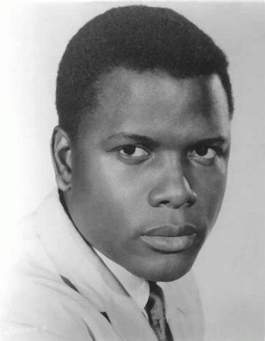 A young Sidney Poitier
A young Sidney Poitier Sidney Poitier, born in 1927, was the youngest of eight sons and a daughter born to Reggie and Evelyn Poitier. But this isn’t just about Sidney; it’s also about the father who raised him and the values he taught Sidney and his siblings. Reggie Poitier was a tomato farmer on Cat Island, a small island in the Bahamas. He was a simple man who did not like to wear shoes. But he grew delicious, plump tomatoes. However, the tomato farm failed when Florida stopped importing them. He had to move the family from Cat Island to the capital city of Nassau to find work when Sidney was ten years old. In Nassau, the younger Poitier found a much faster pace, new friends, and urban temptations. He also found many more White folks and noticed the segregation. Bahamians were taught that they had to work twice as hard to get half as much as Whites.
He seemed to have a knack for finding trouble in Nassau, never too serious, but after getting arrested for stealing corn, his father Reggie thought it might be best for him to go live with his big brother in Miami. There, he would meet the challenges of the 1940’s Jim Crow south. But by this time, Reggie had instilled in his son a sense of values and self that helped him to avoid being demeaned.
Sidney could not accept the feeling of unworthiness he found there. Sidney rebelled against that notion! In his autobiography, he declared, “Hey, not only am I not that which you would make me. Here’s what I in fact am. First of all, I’m the son of a really terrific guy, Reginald James Poitier…….You can harp on that color crap as much as you want, but because of the way I was raised, I don’t have a receptor that’s gonna take in any of that.”
Sidney eventually escaped the oppressiveness and mean-spiritedness of 1940s Florida and went north to New York City, specifically Harlem where two years later he wandered into the American Negro Theater. That act of fate eventually took him to fame and fortune. But times were tough getting there. He labored as a dishwasher and had a stint in the Army that didn’t end well. What was it that kept him strong when times were bad? What was it that gave him strength and confidence in the face of humiliation because of his blackness? How did he have the will to overcome his sing-song Bahamian accent which had kept him from getting acting roles?
A foundation on which to build!
Even though Reggie was poor and had little to provide for his family, he knew his legacy would be his role as a father and he was intent on setting a foundation of values. When Sidney wrote his autobiography, he entitled it after a quote from his father. “The measure of a man is how well he provides for his children.” The Measure of a Man, published in the year 2000, discusses some of the lessons he learned from his father, Reggie.
Reggie was an enforcer of standards. When his children strayed, they paid the price. In a passage from The Measure of a Man, Sidney Poitier writes.
“The fact is you can’t do that kind of parenting if your values aren’t clear to you in terms of your own life. You can’t be passing on to your kids a strong foundation if you don’t have one yourself—because whatever foundation you do have, that’s what you’re going to pass on. And when we pass on something that doesn’t serve our children, we have to be responsible for that.”
They lived in a shack, had no running water, but Reggie’s greatest legacy was passing on the knowledge that “in discipline and commitment lies hope”. What would have happened with Sidney’s life had he not learned from his father? Certainly we would not have enjoyed his wonderful roles in “The Heat of the Night” or “Guess Who’s Coming to Dinner?” He was a boy who had a knack for getting into trouble. But he was corralled by father who gave him his own foundation of belief in himself.
Mistakes were made by both Reggie and Sidney. We all make mistakes, some big, some small. That is why we all need a solid foundation to fall back on. The father-child relationship is enormously relevant to the future of that child, but a son needs a role model to follow, to challenge, and to grow with confidence into a man. What some Reggie Portier had that many fathers lack, according to his son, was “a wonderful sense of himself.”
A good father is not defined by his lack or abundance of wealth or his lack of perfection. He is defined by the lessons and foundation of values he teaches his children and especially as a role model to his sons. Boys like young Sidney will make mistakes and be challenged constantly. Where will they find the tools and confidence to overcome mistakes and face challenges? A boy will first look to his father expecting the answers may be there. With a strong foundation, a father can do that for him.








